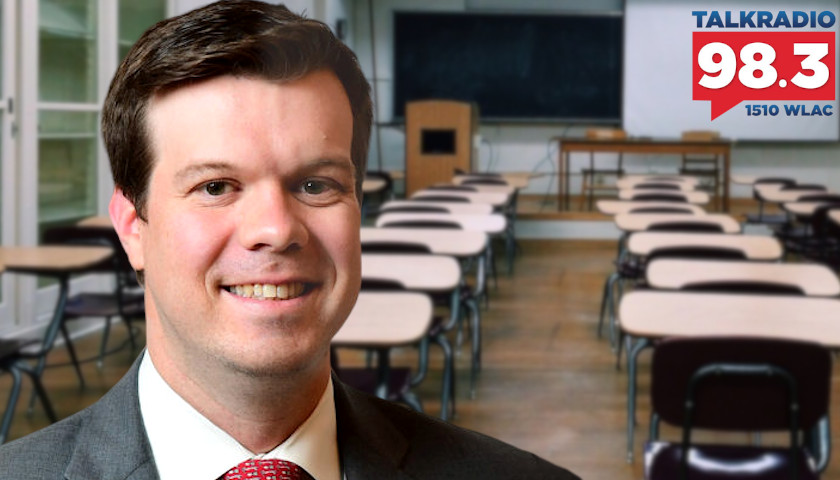In a special interview, Wednesday morning on The Tennessee Star Report with Michael Patrick Leahy – broadcast on Nashville’s Talk Radio 98.3 and 1510 WLAC weekdays from 5:00 a.m. to 8:00 a.m. – host Michael Patrick Leahy welcomed State Communications Director for Tennessee’s American Federation for Children, Gillum Ferguson on the newsmakers line.
During the third hour, Gillum explained the politics of the education savings account and cited recent polling which revealed a bipartisan percentage of Republicans and Democrats in favor of the legislation. He went on to describe how the program works and the tools to determine students’ eligibility for the program.
Leahy: We are joined now by Gillum Ferguson, communications director for the Tennessee Federation for Children. Part of a national group, National Federation for Children. There’s a new poll out about Tennessee Republican primary voters. It shows overwhelming support for the education savings account. Sometimes called “vouchers.” Welcome, Gillum!
Ferguson: Hey Michael Patrick, thanks for having me this morning.
Leahy: Great to have you here. Of course, we are in the studio here with the original all-star panelist Crom Carmichael. Tell us about this poll taken just recently of 630 likely Republican primary voters in Tennessee. Looks like there’s a very big support for these education savings accounts. The law that was passed by the state legislature. Signed into law by Governor Bill Lee and coming this fall to students in Davidson County and Shelby County.
Ferguson: Yes. That’s right. So we still have really great support. Again, a statewide poll of likely Republican primary voters across the state. And this was really Governor Lee’s signature achievement, his signature priority during the legislative session this last year. Of course, Republicans in the state legislature tried to pass an education savings account or vouchers.
And this is the year that they finally got it done. You know, one of the things that we saw that was really indicative in this poll is that 71% of Republican voters think that the state is on the right track as a whole.
Leahy: That’s a very compelling number, isn’t it? When you look at the country overall, it’s like wrong track by 10 points. That’s very good for Tennessee.
Ferguson: Yes, absolutely. And I think it’s a testament to the leadership we’ve had over the past in the governor’s office and the state legislature. But then when you compare that to how Republican voters feel about public education, only 3% think that we’re on the right track.
I think that part of that disparity that folks realize that our public education system is not always serving our students well. And that’s one of the many reasons why we should be expanding options for parents. Whether that’s education savings accounts or charter schools in Tennessee.
Leahy: Gillum, that is actually a stunning number. 71% of likely Republican primary voters in Tennessee think the state is on the right track. But only 33% of those voters think public education is on the right track. Crom Carmichael wants to ask you a question, Gill.
Carmichael: Thanks for doing the poll. But it is indicative of when you put the government in charge of something. Not just in charge of policy but actually in charge of the execution of the policy. It doesn’t work. And the reason for that is that markets are there to provide information on where to make changes.
When you have a monopoly and you have a monopoly when children are assigned to a particular school. And they have to go there whether that’s the choice the parents would make or not. And then the schools are not subject to market conditions.
Do you, by the way, have any polling data polling on likely Democrat primary voters? I’d be interested to see how they line up with Republicans on the issue of whether or not our government-run schools are providing quality education.
Ferguson: Yes, we do. So, not in this specific poll but in our poll earlier this year. We found at least over 55% of Democratic voters support expanded choice like an education savings account. Over 60% support charter schools. Our national organization, Federation for Children did a national poll with Real Clear Politics.
Earlier this fall they found that over 60% of Democratic voters across the country support the concept of school choice. And that’s even higher. 71% of African Americans and 68% of Latino voters support the concept of school choice. Now we find that often times across the country it’s Democratic lawmakers who are out of step with their constituents and who don’t listen and who are adamantly opposed to giving folks an option to vote with their feet.
Carmichael: What you have there is the old dictum, “follow the money.” And the teachers’ unions give vast amounts of money to Democrats who oppose school choice because it would wreck their control of all that money that they get from the teachers’ unions.
I have recently come to the conclusion that the best way to free the Democrats from the ideology that is out of step is to do away with all government employee unions and therefore it does away with the money that the Democrats take and then they sell their souls to the teachers’ unions. And I’m not attacking the teachers.
I’m attacking the unions. And that’s the leadership and the leaders only care about political power. What you’re saying is that Democrats in general and Republicans in general line up almost exactly the same in terms of wanting school choice, charter schools, and especially in the black and Hispanic communities. I think you said that was even higher on the Democrat side than white Democrats. Is that correct?
Ferguson: Yes. That’s correct.
Leahy: Here in Tennessee the teachers union is opposed to this voucher program, right?
Ferguson: Yes, they tried to pull out all the stops to block this vote at every level in the House and the Senate and then yet they were unsuccessful. They have been successful for a number of years. But this was the year Republicans in the legislature and with the help of one Democrat, John DeBerry out of Memphis were able to finally pass this bill for kids here in Tennessee.
Carmichael: Good for John DeBerry.
Leahy: Now here’s an interesting question that you posed. You asked if it was possible to support both public education and expanded school choice vouchers or education savings accounts. What were the results of that?
Ferguson: Yes. This was a question that we think is very telling. Whether we can both support our public education system and invest in that while also expanding options for families. Among Tennessee Republican primary voters, over 61% agree with that. They think that you can do both. Only 17% disagreed.
I think that that’s very telling. You know, we at the American Federation for children are agnostic. We don’t care if you choose to send your kids to a traditional public school, a public charter school, an independent school, or home school. We think that’s up to you, the parent, and that you are better equipped to make the right decision for your child.
Now, on the other hand, the other side, our opponents, often the teachers’ unions are the ones saying this is an either-or. You can either go to the public education system or you can take a hike. That is out of line with Republican primary voters in Tennessee and I would suspect with Democratic voters as well.
Leahy: Do you anticipate any efforts by the Democrats or the teachers’ unions to repeal this education savings account law that’s going into effect this year?
Ferguson: We’ve seen the bill. There’s been a bill filed but you know, it’s funny, to get this law passed it had to pass 11 different votes in the committees in both the House and the Senate. A number of those were close. A number weren’t. I think it will be very hard for the other side, especially for Bo Mitchell from Nashville, for them to be able to rally enough support to get through every 11 votes.
Again, this is the Governor’s signature piece of legislation from last year. He is invested in this. He is invested in making it succeed. A lot of legislative leaders in both the House and the Senate are invested in making this program succeed and work for kids. I think it will be very, very difficult for any attempt like this to get off the ground. And frankly, even if it were to advance in the House, I think it would be dead on arrival in the Senate.
Carmichael: Do we know whether or not it’s coming out this fall? When do parents have to apply for the voucher? When will we know how many parents in Davidson County and Shelby County applied for vouchers? Because there’s a limit for what 5,000?
Leahy: I think it’s 5,000.
Carmichael: In each county or total?
Ferguson: It’s a total of 5,000 in the first year and that’s spread between the two counties. And that’s on a first come first serve basis. There’s no cap in either county. It’s just the 5,000 within those two counties that apply first.
And so we expect the application to open and that will be run through the Department of Education. That will be open we expect sometime during the month of February. But in the meantime, we actually have a tool that we’ve built. It’s at TNESA.org/eligibility.
For more information about school vouchers in Tennessee go to Tennessee’s American Federation for Children website here.
Listen to the third hour:
– – –
Tune in weekdays from 5:00 – 8:00 am to the Tennessee Star Report with Michael Patrick Leahy on Talk Radio 98.3 FM WLAC 1510. Listen online at iHeart Radio.
Photo “Gillum Ferguson” by Federation for Children.





